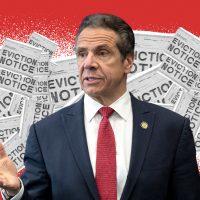UPDATED, Aug. 7, 2020, 12:22 p.m.: Gov. Andrew Cuomo re-upped New York’s eviction ban just a few hours before the moratorium was set to expire.
The new executive order issued Wednesday evening extends the pause on most evictions until Sept. 4. Cuomo’s moratorium, first announced May 7, supplanted an initial universal ban put in place by courts in March.
While a win for tenant activists, it is not yet clear how the court system will interpret the order. Housing court has at times appeared to contradict Cuomo’s executive rulings, which would have allowed at least some evictions to proceed.
A spokesperson for the court said that a stay on evictions, which has been in place since March 16, “continues to be in effect.”
A Thursday memo from the Department of Investigation to the city’s marshals, which execute evictions, said the March order “suspending all eviction proceedings and pending eviction orders continues in effect, until further notice.” But that could change based on the court’s guidance, which the DOI said it “expected shortly.”
Read more


Since May, housing courts have been holding some limited virtual eviction proceedings — although the procedures are not consistent across all five boroughs. In Brooklyn, legal practitioners were surprised at an announcement that in-person proceedings could begin in Kings County at the end of July.
As news of the late-night extension reached tenant groups, protesters from the Crown Heights Tenant Union claimed victory outside the Brooklyn housing court on Thursday morning. Tenant activists from that group and others have plagued real estate law firms this week, filling the hallways outside attorneys’ offices with cries of “no landlords, no cops” amplified by bullhorns.
Law firms Stern and Stern and Slochowsky & Slochowsky were among those visited by the demonstrators on Wednesday, the last day before the eviction moratorium expired.
Had the moratorium not been extended, legal services providers said that 14,000 pre-pandemic eviction warrants would move forward. New legislation that allows tenants to fight evictions if they can document financial distress as a result of Covid-19 does not apply in those cases.
Relatively few evictions have been filed in New York City since the pandemic hit. New York City has a lower eviction rate than places elsewhere in the country, which many attribute to strict rent regulation. States including Kentucky, Missouri, Arizona and Texas have seen a surge of evictions as their local eviction bans expire. Tenants have responded with increasingly bold and desperate efforts to remain housed, while landlord groups have filed nearly a dozen lawsuits to peel back remaining eviction bans and jumpstart court proceedings.
In the third week of July, a third of renters surveyed by the U.S. Census said they had little or slight confidence in their ability to pay the next month’s rent. An eviction moratorium covering federally backed mortgages — which had no provision for enforcement — expired on July 24.
On Monday, President Donald Trump said he would stop evictions if Congress failed to reach an agreement on a new aid package. Time is running out for Congress to pass another relief package before its scheduled recess, which starts after August 7.
UPDATE: This story has been updated to include guidance from the Department of Investigation to the city’s marshals, which execute evictions.
